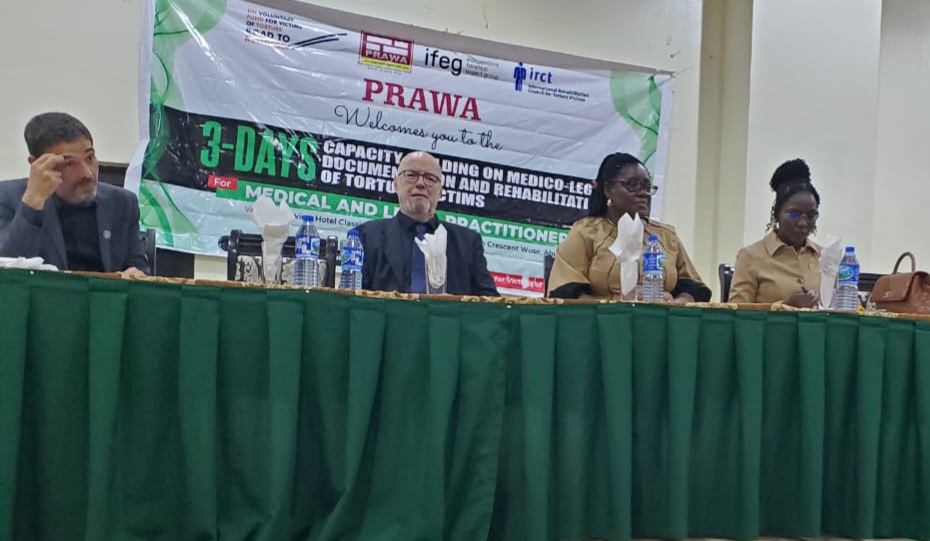•As PRAWA calls for rehabilitation of torture victims
Senator Iroegbu
The Nigerian government is actively working to eradicate torture within the country, according to the Solicitor-General of the Federation, Mrs. Beatrice Jeddy-Agba.
She made this announcement during a three-day training event in Abuja focused on Medico-Legal documentation and the rehabilitation of torture victims. The event was organized for medical and legal professionals by the Prisoners Rehabilitation and Welfare Actions (PRAWA), the UN Voluntary Fund for Victims of Torture, Independent Forensic Expert Group, and the International Rehabilitation Council for Torture Victims.
Jedy-Agba emphasized that the Ministry of Justice, under her leadership as Permanent Secretary, is collaborating closely with law enforcement agencies, Civil Society Organisations, and International Organizations to achieve their goal of ending torture.
The Solicitor-General highlighted that Nigeria is committed not only to meeting its international obligations but also to revising anti-torture legislation and integrating anti-torture measures within law enforcement and detention facilities.
“As the lead anti-torture agency, the ministry will work closely with stakeholders and development partners to end torture in the country,” Jedy-Agba declared. She also acknowledged the government’s responsibility to ensure the restitution and rehabilitation of torture victims, emphasizing the need to review the provisions within the local anti-torture framework.
Jedy-Agba stressed the importance of treating all prisoners with dignity and respect, in line with the principles enshrined in the Nigerian Constitution, which prohibit cruel, inhumane, and degrading treatment of individuals.
Nigeria is a signatory to several international treaties and conventions, including the Universal Declaration of Human Rights, the International Covenant on Economic, Social and Cultural Rights, the International Covenant on Civil and Political Rights, and the United Nations Convention against Torture. These agreements guarantee the human rights of all citizens, including those in detention.
Furthermore, Jedy-Agba highlighted that Nigeria has signed and ratified the United Nations Convention against Torture (UNCAT) and the Optional Protocol to the Convention against Torture (OPCAT). The country has also enacted the Anti-Torture Act to prohibit and punish acts of torture committed by Public Officers. Additionally, the Federal Government established the National Committee Against Torture (CATNigeria) and the National Preventive Mechanism in compliance with OPCAT provisions.
In her closing remarks, Jedy-Agba called on stakeholders, both in the public and private sectors, to unite against torture perpetrators and advocate for those who have suffered at their hands. She emphasized that this collective effort is essential to build a more humane society.
She also stressed the significance of consistent capacity building and the use of modern tools such as ICT to identify and address incidents of torture in Nigeria.
Dr. Uju Agomoh, the Executive Director of PRAWA, echoed the call for the rehabilitation of torture victims and the prosecution of perpetrators.
She highlighted PRAWA’s ongoing efforts to amplify the voices of torture victims and emphasized the importance of building strategies and a dedicated core group to drive the anti-torture campaign. Agomoh underscored that proper documentation of torture cases is vital for building concrete evidence for the prosecution of perpetrators.
She said: “We must maintain a coordinated effort involving lawyers and medical professionals in training. It’s crucial to gather strong evidence to be well-prepared for court cases and to ensure that all perpetrators are prosecuted and sanctioned upon conviction, preventing impunity.”
The training event aimed to equip participants, including legal professionals, psychologists, medical doctors, and paralegals, with the necessary skills and competency to effectively document cases of torture in Nigeria.
Agomoh concluded by emphasizing the importance of prosecuting all perpetrators and sanctioning them when found guilty to combat impunity effectively.

